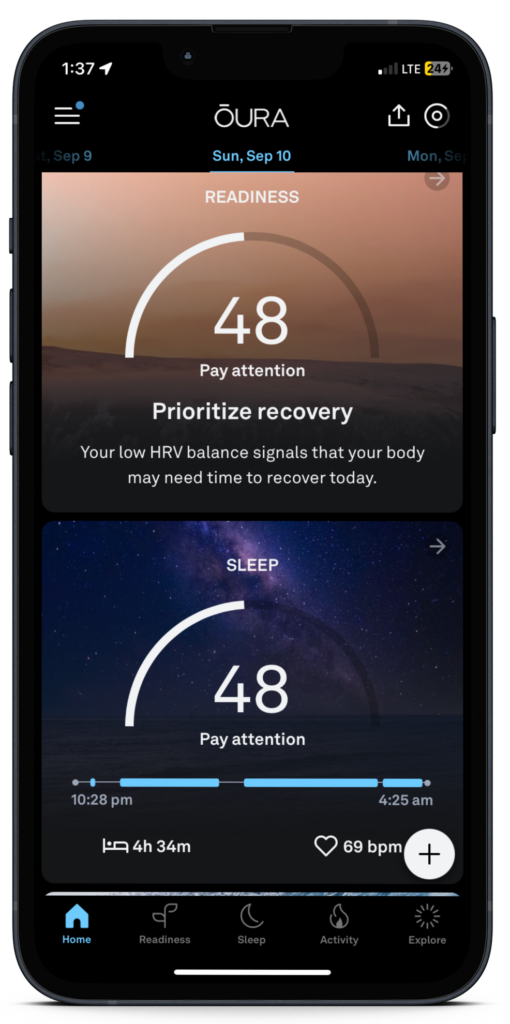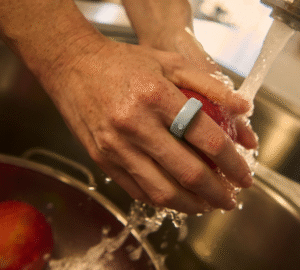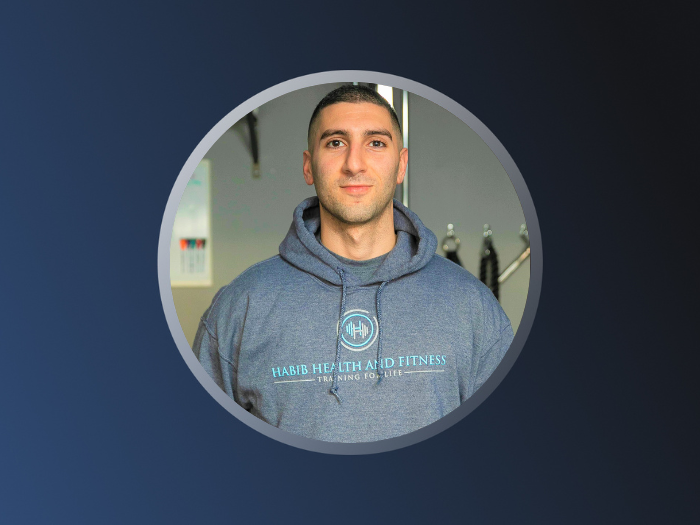Who: Robert H., 32, owner of a personal training company and father of two, Maryland, USA
Surprising Oura insight: After moderating his exercise routine and implementing healthier habits, Robert was able to improve his resting heart rate from 60 bpm to 48 bpm.
As a personal trainer, Robert works early in the morning and late at night. He originally became an Oura member to develop better sleeping habits. Through his Oura data, he began to realize that intense workouts and late-night eating were affecting his sleep.
His health lessons soon went beyond sleep. “When I first started in the fitness industry, my focus was always on aesthetics — to see how strong or muscular I could get,” Robert says. “As I got older and had children, I realized that aesthetics are not necessarily linked to health and longevity. There are better indicators of health beyond how you look.”
Below, Robert shares some of the biggest lessons he’s learned since joining the Oura community.
How have your health goals evolved since using Oura?
Oura helped me take into consideration health metrics like resting heart rate (RHR). When I first started using Oura, my RHR was in the 60s – it was probably from overtraining and poor sleep. Now, it’s 48 on average.
I also used to think that the more exercise, the better. I was constantly in a high-stress state and not getting enough sleep. Now, I’ve learned the value of recovery. Overall, I want a training routine that keeps my heart healthy, promotes good sleep, and reduces my stress.
When I don’t have a good night’s sleep, I can tell that my body is stressed. I feel on edge, less patient with people, and start craving unhealthy food. I also see it reflected on my Oura Stress graph!
| Member Tip: Most healthy adults can expect resting heart rates to range from 60 to 100 beats per minute. A lower RHR can be a sign of better physical fitness. Take note of your long-term trends to see if your RHR is changing over time. |
What lifestyle habits have you incorporated that helped improve your RHR?
My RHR improved as I improved my sleep, so it’s all connected. A few other small but effective changes I made include:
- More cardio exercise, which is great for heart health!
- A combination of higher and lower-intensity exercise
- Lower frequency of workouts
- Earlier bedtimes: I used to be in bed around 11:30pm, but now I’m asleep by 9:30pm
- Improving my sleep hygiene, such as avoiding late-night eating and late-night workouts
- Managing stress and slowing down in general
READ MORE: 9 Simple (and Science-Backed!) Ways to Lower Stress
How has becoming a parent impacted your sleep?

Typically my sleep schedule is 9:30pm to 5:15am, and I sleep straight through. But now, I’m waking up one to three times a night. So I’m getting broken sleep but also less sleep overall.
I also saw that my heart rate variability (HRV) has dropped from the 40s to the 30s, indicating that my body is under more stress. Having a newborn is stressful, so I’m not surprised by this! It’s become important for me during this stage to focus on managing my own stress levels and trying to prioritize sleep when I can.
READ MORE: Sleep 101 for New Parents
What are your favorite Oura features?
- Sleep stages: If I notice that one night I get lower amounts of deep sleep, I’ll reflect on the previous night’s habits. For instance, I’ve learned that going on my phone impacts my sleep. Drawing these connections has helped me continuously improve my sleep quality.
- Body temperature trends: Every time I have seen spikes in my body temperature, I have gotten sick a day or two later. I’m now proactive – if I see a spike, I focus on recovery to try and avoid the sickness!
- Bedtime Guidance: I always get better sleep when I go to bed during this window.
- Body Clock/Chronotype: I have learned to structure my day in line with my chronotype. For example, I used to exercise at night, but I’ve now shifted my workouts to the mornings.
RELATED: “Being Active Is in Our DNA:” Father, 91, and Daughter, 56, Both Use Oura To Stay Healthy
What do you wish more people knew about fitness?
Exercise is great for you, but it’s also a type of stress. When you work out too much or sleep too little, you’re not balancing that stress with recovery, so your cortisol levels will remain elevated, which creates a vicious cycle. Instead of benefitting from exercise, it can exacerbate your stress.
Many people don’t realize how stressed out they are already — with kids, school, work, etc. They don’t take into consideration that exercise is placing greater stress on their body.
I have clients who come to me sleep deprived and stressed, and they think pushing themselves in a workout will help. It won’t – it can actually lead to injury and prevent them from making progress. In these cases, I typically lower the intensity of their workout, opting for mobility work and light movement.
| Member Spotlight: After improving his sleep, Brian K. realized that he was more empathetic and patient, helping him become a more effective CEO. |
READ MORE: Reframing Stress: The Difference Between “Bad” and “Good” Stress
What’s Your Oura Story?
Everyone’s story is unique, and we’d love to hear yours. Share your story here.











